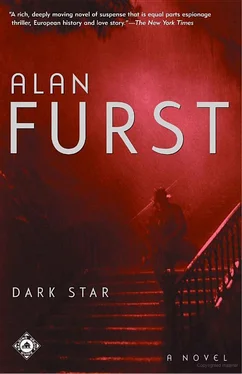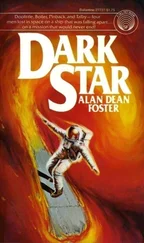Alan Furst - Dark Star
Здесь есть возможность читать онлайн «Alan Furst - Dark Star» весь текст электронной книги совершенно бесплатно (целиком полную версию без сокращений). В некоторых случаях можно слушать аудио, скачать через торрент в формате fb2 и присутствует краткое содержание. Жанр: Шпионский детектив, на английском языке. Описание произведения, (предисловие) а так же отзывы посетителей доступны на портале библиотеки ЛибКат.
- Название:Dark Star
- Автор:
- Жанр:
- Год:неизвестен
- ISBN:нет данных
- Рейтинг книги:3 / 5. Голосов: 1
-
Избранное:Добавить в избранное
- Отзывы:
-
Ваша оценка:
- 60
- 1
- 2
- 3
- 4
- 5
Dark Star: краткое содержание, описание и аннотация
Предлагаем к чтению аннотацию, описание, краткое содержание или предисловие (зависит от того, что написал сам автор книги «Dark Star»). Если вы не нашли необходимую информацию о книге — напишите в комментариях, мы постараемся отыскать её.
Dark Star — читать онлайн бесплатно полную книгу (весь текст) целиком
Ниже представлен текст книги, разбитый по страницам. Система сохранения места последней прочитанной страницы, позволяет с удобством читать онлайн бесплатно книгу «Dark Star», без необходимости каждый раз заново искать на чём Вы остановились. Поставьте закладку, и сможете в любой момент перейти на страницу, на которой закончили чтение.
Интервал:
Закладка:
“I can. I obtained the false identity myself, and the newspaper has known nothing of me since I left Poland.”
Hartmann paused. Szara sensed discomfort. The interrogator took refuge in the notes he’d made to himself to guide him in the interview, but they were all wrong now. His Frenchman, trapped on the wrong side of the lines, had disappeared. In his place stood a Russian, a rather prominent one he suspected, captured while in flight from the USSR, Germany’s nominal ally. Hartmann cleared his throat, for him a gesture of irritation. He had to question his competence to work in such areas. All sorts of intimidating issues suddenly made themselves felt; the prisoner’s culpability under German law, possible extradition, others he could not even imagine. All of them grave, difficult, complex, and ultimately to be resolved in a political, not a legal, context. This was obviously not going to be a case he would be allowed to pursue; he could put himself in a good light only by presenting to his superiors the most precise information. Hartmann took up his pen and turned to a fresh page in his writing tablet. “Slowly and clearly,” he said, “and beginning with your surname, you will please spell.”
It rained hard that night, for Szara a blessing. It reminded him that there was a world outside his cell, and the steady splash on the high, grilled window muted, if it could not quite obliterate, the sounds of a Gestapo prison. His plan was successfully launched; Hartmann had ended the interview with the utmost correctness. Szara suspected they would not see each other again, and in the event this turned out to be the case.
Szara’s strategy of revelation without defiance had proceeded from one basic assumption: he could not be sure he would withstand what was euphemistically known as intensive interrogation. He feared he would first give up the existence of the OPAL network, and that would lead inexorably to the exposure of Nadia Tscherova. He had to avoid the cellars in Berlin and then, if it came to that, the cellars in Moscow.
The conventions of the German character first specified efficiency-thus they’d arrested him. A crucial component of that efficiency, however, was thoroughness, and this he perceived to be his possible ally. Now that they knew who he was, he expected they would want from him all they could get, essentially political intelligence. Who did he know? What were they like? How, precisely, was the political line of Pravda determined? What personalities were at play? For his part, he meant to make use of what he called the Scheherazade defense: as long as he intrigued them with stories, they would not execute him or send him back to Russia. In the normal interrogation process, where every statement raised questions, a cooperative subject might continue the discussion for a period of months. Szara’s hope lay in the fact that Germany was at war, and in war it was a given that unpredictable things happened, including catastrophes of all sorts-invasions, raids, bombings, mass escapes, even negotiations and peace. Any or all of it might be to his advantage. And if they should reach the end of the line with him and determine to ship him back to Russia, he then had one last move to make: he could contrive to take his life by attempted escape, from the Germans or the Russians, whoever gave him the barest edge of an opportunity.
It wasn’t much of a plan, he knew, but in his circumstances it was all he had. It might have worked. He was never to find out, because there was one convention of the German character he’d neglected to include in the equation.
They came for him after midnight, when the sounds of the Gestapo interrogations were impossible not to hear and sleep was out of the question. First there was the clang of a gate, then approaching footsteps in the corridor. Szara gripped the frame of the cot with all the strength in his hands, but the footsteps halted outside his cell and the door burst open. Two SS troopers stood in the spill of strong light, recruiting poster SS, tall and fair and sallow in their black uniforms. Then it was “Raus!” and all that, toothy grins, the silent sharing of the great joke that only they understood. Holding his beltless pants up with his hands, he hurried along the corridor as best he could, shuffling because they’d taken his shoelaces as well. His mind had gone numb, yet his senses seemed to operate independently: the troopers smelled like a gymnasium, a man in an isolation cell moaned as though in a dream. They went down several flights of stairs, at last arriving in a brightly lit office filled with desks, the walls covered with beautifully drawn charts and lists.
A little gnome of a man waited for him at a railing; in his hands a wet hat dripped onto the linoleum. Eyes down, Szara thought he saw an edge of pajama bottom peeking out from one leg of the man’s trousers. “Ah,” said the man in a soft voice. “It’s Herr Szara.”
“You’ll have to sign for him,” said the taller of the two SS.
“It’s what I do,” said the man, almost to himself.
Papers were produced and laid on a desk. The gnome carefully unscrewed the cap of a silver fountain pen. He began to scratch a well-flourished signature at the bottom of each page. “Have we all his things?” he asked as he wrote.
The SS man pointed to the door, where Szara’s valise stood to one side with several envelopes stacked on top of it. When the last signature was executed, the gnome said, “Come along, then.” Szara held the envelopes under one arm, picked up the valise, and used his free hand to hold his pants up. “Do you have an umbrella we can use?” the gnome asked the SS trooper.
“A thousand apologies, mein Herr, it’s something we don’t have.”
The gnome sighed with resignation. “Good night, then. Heil Hitler. Thank you for your kind assistance.”
In the floodlit courtyard stood a small green Opel, its hood steaming in the rain. The man opened the door and Szara climbed in and leaned back against the leather seat. Water sluiced down the windshield and blurred the floodlights to golden rivers. The little man slid behind the wheel, turned on the ignition, said, “Excuse me,” and, leaning across Szara, retrieved a Luger automatic pistol from the glove compartment. “Your forbearance,” he said formally, “in not punching me will be appreciated. And please don’t jump out of the car-I haven’t run since childhood. Well, to tell you the truth, I didn’t run then either.”
“May I ask where we’re going? ” Szara opened the envelopes, put his belt on and laced up his shoes.
“You certainly may,” said the gnome, peering through the rain, “but it wouldn’t mean anything even if I told you.” Uncertainly, he steered the Opel across the broad courtyard, flipped a leather card case open and showed it to a guard, then drove ahead when the iron gate swung open. There was a sudden shout behind them.
“What are they yelling about?”
“To turn on the windshield wipers.”
“Yes, well,” the gnome grumbled, turning on the wipers, “wake a man up at midnight and what do you expect.” The Opel turned the corner from Prinz-Albrecht-Strasse to Saarlandstrasse. “So,” he said. “You’re the man who worked in Paris. You know what we Germans say, don’t you. ‘God lives in France.’ Someday I would like to go.”
“I’m sure you will,” Szara said. “I really must insist on asking you where we are going.” He didn’t care if the man shot him. His fingers rested lightly on the door handle.
“We’re going to a place near Altenburg. There. Now the secret’s out.”
“What’s there?”
“You ask entirely too many questions, if you’ll permit me. Perhaps it’s done in France-it isn’t here. I can only say that I’m sure everything will be explained. It always is. After all, you’re not handcuffed, and you’ve just left the worst place you could possibly be- now doesn’t that tell you something? You’re being rescued, so be a gentleman, sit quietly, and think up some entertaining stories about Paris. We’ll be driving for a few hours.”
Читать дальшеИнтервал:
Закладка:
Похожие книги на «Dark Star»
Представляем Вашему вниманию похожие книги на «Dark Star» списком для выбора. Мы отобрали схожую по названию и смыслу литературу в надежде предоставить читателям больше вариантов отыскать новые, интересные, ещё непрочитанные произведения.
Обсуждение, отзывы о книге «Dark Star» и просто собственные мнения читателей. Оставьте ваши комментарии, напишите, что Вы думаете о произведении, его смысле или главных героях. Укажите что конкретно понравилось, а что нет, и почему Вы так считаете.












